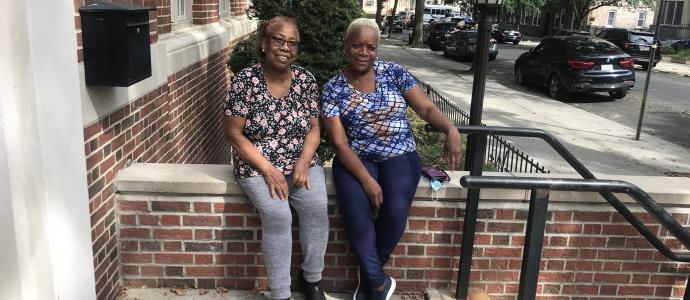Share
Pearl McGillvery’s homemade pot of chicken soup is what opened the doors to a career as a Direct Support Professional (DSP). McGillvery worked housekeeping jobs when she first came from Trinidad to the United States in the early ‘90s. She was cleaning the home of a former YAI staff person when she was asked to go out and buy some soup for the homeowner.
“I told her, ‘Why don’t I just make you some soup instead?’” said McGillvery. “She found it so caring and genuine that I would offer.”
That kind gesture led the homeowner to refer McGillvery, 65, to a DSP job at YAI. It’s where she has been for the past 21 years. Today she works in Bay Ridge 2, a YAI residence that houses eight elderly people. What brought her to the profession may have been fortuitous, but what has kept her is her love for supporting people with intellectual and developmental disabilities (I/DD).
“When I come to work, they greet me with passion, and I take care of them with pure love in my heart,” McGillvery said. “At the end of each day I say, ‘Lord I did something good...’ they give me strength and make me want to stay with them.”
Sylvia Forrester, 61, also a DSP at Bay Ridge 2, has been in the profession for 16 years. After babysitting for several years, Forrester was referred to the job by McGillvery, whom she knew from Trinidad.
“I always liked caring for people, but what made me want to switch from babysitting to this profession was the stability it provided,” said Forrester. “After the kids grew up, I had to find another family to babysit for and I didn’t want to keep moving and wanted a career instead.”
McGillivery and Forrester are among the roughly 2,000 DSPs working at YAI. Often referred to as the backbone of any I/DD agency, DSPs do it all. They not only teach life skills but preserve the delicate balance of knowing how to provide just the right amount of support, enabling people with I/DD to live as independently as they can.
However, as much personal fulfillment the job brings, the profession still faces a staffing shortage, with turnover rates among DSPs as high as 46% nationally. The added stresses of the pandemic have only exacerbated the challenges faced by those in the field, the main ones being stagnant wages, lack of affordable health insurance for themselves and their families, and little to no public recognition for the importance of their role. The average DSP hourly wage is $13.20, according to American Network of Community Options and Resources (ANCOR). Over the years, YAI has worked hard to address these problems, including revamping benefits that are above the national average, including free health insurance premiums, flexible work hours, and a series of new incentives and merit payments.
Despite the drawbacks, McGillvery and Forrester said they stay because YAI gives them the support and resources they need to keep going and the opportunity to move around to different programs depending on their interests. Moreover, strong leadership that fosters personal growth is also key to retaining staff, they added.
“At YAI, we provide quality services, and that is not something I heard about, it’s something I experienced firsthand,” said Sonja Williams, Director of YAI Knowledge, YAI’s training department. Williams herself started with the agency as a DSP in 1992 and worked in the field for eight years before transitioning to her role as a full-time trainer.
“A self advocate once told me that when DSPs change programs, for them is like your family member changing. And they said to me, ‘can you imagine your family member changing every 18 months?’ A lot of DSPs recognize that there’s a huge commitment and their first allegiance is to the people they support,” said Williams.
Beyond state-mandated trainings for DSPs, YAI takes it a step further and provides skill enhancement courses to ensure staff are equipped to meet the specific needs of the people they are supporting. These include trainings on supporting a person with I/DD who also has a mental health condition, working with a resident who has dementia, or someone who has a profound disability.
Most recently, YAI rolled out a self-care class that focuses on tending to mental health while in a demanding job. “We created tools for people to use at work and at home and just recognizing that you can’t pour into someone else from an empty cup,” said Williams. Bite-sized trainings that offer nuggets of information delivered in 20 minutes or less is another way YAI hopes to retain its staff and recruit more during these trying times.
“We know that with the work we do, we have to provide that quality training because it trickles down to the staff who can then provide people we support the kind of services they deserve,” said Williams.

